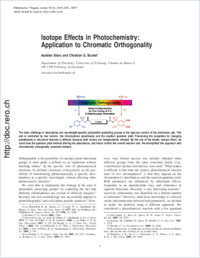Isotope effects in photochemistry: application to chromatic orthogonality
- Blanc, Aurélien Department of Chemistry, University of Fribourg, Switzerland
- Bochet, Christian G. Department of Chemistry, University of Fribourg, Switzerland
-
08.06.2007
Published in:
- Organic Letters. - 2007, vol. 9, no. 14, p. 2649-2651
English
The main challenge in developing new wavelength-specific photolabile protecting groups is the rigorous control of the photolysis rate. This rate is controlled by two factors: the chromophore absorbance and the reaction quantum yield. Fine-tuning the properties by changing substituents or structural features is difficult, because both factors are independently affected. By the use of the kinetic isotope effect, we could tune the quantum yield without altering the absorbance, and hence control the overall reaction rate. We exemplified this approach with chromatically orthogonally protected diesters.
- Faculty
- Faculté des sciences et de médecine
- Department
- Département de Chimie
- Language
-
- English
- Classification
- Chemistry
- License
-
License undefined
- Identifiers
-
- RERO DOC 8583
- DOI 10.1021/ol070820h
- Persistent URL
- https://folia.unifr.ch/unifr/documents/300583
Statistics
Document views: 128
File downloads:
- pdf: 360
